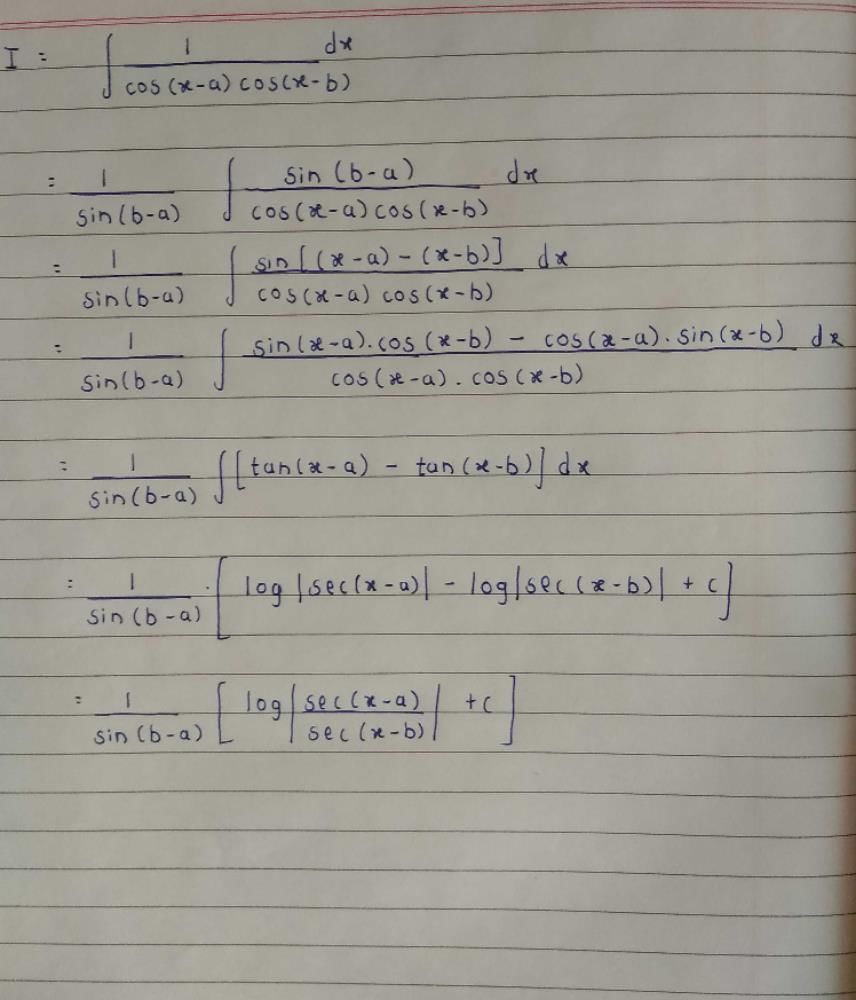JEE Exam > JEE Questions > Integration of 1/cos(x-a)cos(x-b)dx?
Start Learning for Free
Integration of 1/cos(x-a)cos(x-b)dx?
Most Upvoted Answer
Integration of 1/cos(x-a)cos(x-b)dx?

Community Answer
Integration of 1/cos(x-a)cos(x-b)dx?
Integration of 1/cos(x-a)cos(x-b)dx:
To integrate the given expression, we can use the concept of trigonometric identities and some algebraic manipulations. Let's break down the process step by step:
Step 1: Identifying the Trigonometric Identities
First, let's simplify the expression by using the trigonometric identity:
cos(A - B) = cos(A)cos(B) + sin(A)sin(B)
Using this identity, we can rewrite the expression as:
1/cos(x-a)cos(x-b) = 1/[cos(x)cos(a) + sin(x)sin(a)][cos(x)cos(b) + sin(x)sin(b)]
Step 2: Expanding the Expression
Next, we can expand the denominator by multiplying the terms using the distributive property:
= 1/[cos(x)cos(a)cos(x)cos(b) + cos(x)cos(a)sin(x)sin(b) + sin(x)sin(a)cos(x)cos(b) + sin(x)sin(a)sin(x)sin(b)]
Step 3: Simplifying the Expression
Now, let's simplify the expanded expression by combining like terms:
= 1/[cos(x)cos(x)cos(a)cos(b) + sin(x)sin(x)sin(a)sin(b) + cos(x)sin(x)cos(a)sin(b) + sin(x)cos(x)sin(a)cos(b)]
= 1/[cos^2(x)cos(a)cos(b) + sin^2(x)sin(a)sin(b) + sin(x)cos(x)[cos(a)sin(b) + sin(a)cos(b)]]
Step 4: Applying the Trigonometric Identity
Now, we can use the trigonometric identity:
cos^2(x) + sin^2(x) = 1
to simplify the expression further:
= 1/[cos(a)cos(b) + sin(a)sin(b) + sin(x)cos(x)[cos(a)sin(b) + sin(a)cos(b)]]
Step 5: Integrating the Expression
Finally, we can integrate the expression by treating the terms as separate components:
∫[1/cos(x-a)cos(x-b)]dx = ∫[1/[cos(a)cos(b) + sin(a)sin(b) + sin(x)cos(x)[cos(a)sin(b) + sin(a)cos(b)]]dx
= ∫[1/(cos(a)cos(b) + sin(a)sin(b))]dx + ∫[sin(x)cos(x)[cos(a)sin(b) + sin(a)cos(b)]]dx
The first integral can be easily evaluated as:
∫[1/(cos(a)cos(b) + sin(a)sin(b))]dx = (1/(cos(a)cos(b) + sin(a)sin(b)))x + C1
where C1 is the constant of integration.
The second integral can be simplified using the substitution u = sin(x)cos(x), which leads to du = cos^2(x) - sin^2(x) dx:
∫[sin(x)cos(x)[cos(a)sin(b) + sin(a)cos(b)]]dx = ∫
To integrate the given expression, we can use the concept of trigonometric identities and some algebraic manipulations. Let's break down the process step by step:
Step 1: Identifying the Trigonometric Identities
First, let's simplify the expression by using the trigonometric identity:
cos(A - B) = cos(A)cos(B) + sin(A)sin(B)
Using this identity, we can rewrite the expression as:
1/cos(x-a)cos(x-b) = 1/[cos(x)cos(a) + sin(x)sin(a)][cos(x)cos(b) + sin(x)sin(b)]
Step 2: Expanding the Expression
Next, we can expand the denominator by multiplying the terms using the distributive property:
= 1/[cos(x)cos(a)cos(x)cos(b) + cos(x)cos(a)sin(x)sin(b) + sin(x)sin(a)cos(x)cos(b) + sin(x)sin(a)sin(x)sin(b)]
Step 3: Simplifying the Expression
Now, let's simplify the expanded expression by combining like terms:
= 1/[cos(x)cos(x)cos(a)cos(b) + sin(x)sin(x)sin(a)sin(b) + cos(x)sin(x)cos(a)sin(b) + sin(x)cos(x)sin(a)cos(b)]
= 1/[cos^2(x)cos(a)cos(b) + sin^2(x)sin(a)sin(b) + sin(x)cos(x)[cos(a)sin(b) + sin(a)cos(b)]]
Step 4: Applying the Trigonometric Identity
Now, we can use the trigonometric identity:
cos^2(x) + sin^2(x) = 1
to simplify the expression further:
= 1/[cos(a)cos(b) + sin(a)sin(b) + sin(x)cos(x)[cos(a)sin(b) + sin(a)cos(b)]]
Step 5: Integrating the Expression
Finally, we can integrate the expression by treating the terms as separate components:
∫[1/cos(x-a)cos(x-b)]dx = ∫[1/[cos(a)cos(b) + sin(a)sin(b) + sin(x)cos(x)[cos(a)sin(b) + sin(a)cos(b)]]dx
= ∫[1/(cos(a)cos(b) + sin(a)sin(b))]dx + ∫[sin(x)cos(x)[cos(a)sin(b) + sin(a)cos(b)]]dx
The first integral can be easily evaluated as:
∫[1/(cos(a)cos(b) + sin(a)sin(b))]dx = (1/(cos(a)cos(b) + sin(a)sin(b)))x + C1
where C1 is the constant of integration.
The second integral can be simplified using the substitution u = sin(x)cos(x), which leads to du = cos^2(x) - sin^2(x) dx:
∫[sin(x)cos(x)[cos(a)sin(b) + sin(a)cos(b)]]dx = ∫

|
Explore Courses for JEE exam
|

|
Similar JEE Doubts
Integration of 1/cos(x-a)cos(x-b)dx?
Question Description
Integration of 1/cos(x-a)cos(x-b)dx? for JEE 2025 is part of JEE preparation. The Question and answers have been prepared according to the JEE exam syllabus. Information about Integration of 1/cos(x-a)cos(x-b)dx? covers all topics & solutions for JEE 2025 Exam. Find important definitions, questions, meanings, examples, exercises and tests below for Integration of 1/cos(x-a)cos(x-b)dx?.
Integration of 1/cos(x-a)cos(x-b)dx? for JEE 2025 is part of JEE preparation. The Question and answers have been prepared according to the JEE exam syllabus. Information about Integration of 1/cos(x-a)cos(x-b)dx? covers all topics & solutions for JEE 2025 Exam. Find important definitions, questions, meanings, examples, exercises and tests below for Integration of 1/cos(x-a)cos(x-b)dx?.
Solutions for Integration of 1/cos(x-a)cos(x-b)dx? in English & in Hindi are available as part of our courses for JEE.
Download more important topics, notes, lectures and mock test series for JEE Exam by signing up for free.
Here you can find the meaning of Integration of 1/cos(x-a)cos(x-b)dx? defined & explained in the simplest way possible. Besides giving the explanation of
Integration of 1/cos(x-a)cos(x-b)dx?, a detailed solution for Integration of 1/cos(x-a)cos(x-b)dx? has been provided alongside types of Integration of 1/cos(x-a)cos(x-b)dx? theory, EduRev gives you an
ample number of questions to practice Integration of 1/cos(x-a)cos(x-b)dx? tests, examples and also practice JEE tests.

|
Explore Courses for JEE exam
|

|
Signup for Free!
Signup to see your scores go up within 7 days! Learn & Practice with 1000+ FREE Notes, Videos & Tests.
























